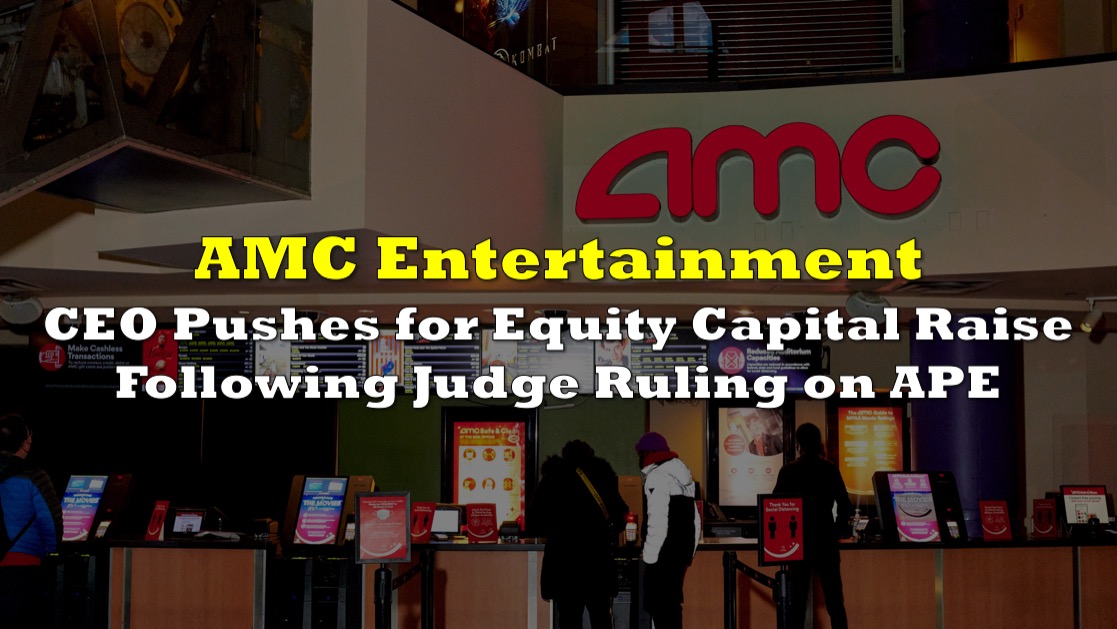In an open letter addressed to shareholders, Adam Aron, CEO of AMC Entertainment (NYSE: AMC), expressed the critical need for the company to raise fresh equity in the near term. Aron highlighted the recent concern raised in the Delaware Court of Chancery’s ruling, emphasizing the importance of addressing it promptly.
After the market closed on July 21, a Delaware Chancery Court judge issued a surprise decision which blocks a settlement that would have allowed the conversion of AMC’s APE preferred units into AMC common stock. Morgan Zurn, the Delaware court’s Vice Chancellor, rejected the settlement because she considered it overly broad.
Most notably, Judge Zurn was troubled that the accord would release legal claims held by AMC common stockholders, including claims involving the APE units. She believes such releases are illegal “even if some common shareholder class members happen to also hold preferred units.”
The court’s ruling prompted investors to scramble to exit that matched pair. AMC common stock shares soared 63% to US$7.17 in after-hours trading while the APE units plunged 14% to US$1.54 in a vicious position unwind.
Aron claimed that since the outbreak of the pandemic, his primary goal throughout this period has been to steer the company away from financial ruin and secure its survival, ultimately putting it on a path to thrive in the future.
“Along the way, I have done my utmost to be transparent with AMC shareholders, and am doing
so again right now,” Aron wrote. “AMC must be in a position to raise equity capital. I repeat, to protect AMC’s shareholder value over the long term, we MUST be able to raise equity capital.”
My open letter message below to you all is on a subject of existential importance to AMC Entertainment shareholders. I urge you to read it. Adam Aron #AMCSurviveThenThrive pic.twitter.com/40tyncnr1n
— Adam Aron (@CEOAdam) July 23, 2023
Aron emphasized the significance in light of the additional uncertainty caused by the ongoing writers and actors’ strikes. These strikes have the potential to delay the release of movies that were originally scheduled for 2024 and 2025, adding to the existing challenges faced by the company.
The CEO pointed out that failure to raise capital could lead to an increased risk of AMC running out of cash in 2024 or 2025, and possibly hinder their ability to refinance and extend the maturity of existing debt. The cautionary tale of other companies such as Cineworld/Regal and Bed, Bath and Beyond, which succumbed to bankruptcy and resulted in substantial losses for equity holders, serves as a reminder of the potential consequences of not taking appropriate action.
Despite the hardships faced, Aron reassured investors that AMC has been proactive and resilient in responding to the COVID-19 challenges. He expressed his confidence in the company’s ability to continue navigating through these complicated times.
“With millions of shareholders, though, understandably there are many voices, many opinions and many critics. Some wish ill for the company and have netarious aims. Some are grandstanding, and trying to gain notoriety for themselves at AMC’s expense. These individuals do not deserve your trust,” he added.
While some individuals may have nefarious intentions or seek to exploit AMC’s situation, Aron recognized that most shareholders are well-intentioned and genuinely seeking to understand the company’s actions and their potential impact on their investments.
Addressing the significant short share position in AMC stock, the CEO emphasized that raising equity capital would help mitigate bankruptcy risks and counter the short thesis. Aron further demonstrated his alignment with shareholders’ interests, stating that he is AMC’s largest retail shareholder with a significant economic stake in the company.
To address the court’s concern raised in the recent ruling, AMC has filed a modification of the legal release surrounding the settlement of the Delaware litigation in collaboration with the plaintiffs. The company hopes that this effort will pave the way for the implementation of the plan approved in the AMC stockholders’ election in March.
Back in April, AMC settled a class action lawsuit filed by shareholders that would allow it to issue stock, raise capital, convert its APE units and go ahead with a 10-for-1 reverse stock split. The whole lawsuit rested upon AMC’s proposals to increase AMC’s authorized common stock so that APE units can be converted into common shares, to affect a reverse split of the company’s common shares at a ratio of 1:10, and to give AMC more flexibility to issue additional common equity in the future.
As part of the settlement however, the defendants–led by Aron–“deny any and all allegations of wrongdoing, fault, liability, or damages with respect to Plaintiffs’ Released Claims.” This includes denying any allegations that defendants have committed any violations of law or breach of any duty and any assertions that the company’s stockholders were harmed by any conduct of defendants pertaining to the suit.
Information for this briefing was found via the sources mentioned. The author has no securities or affiliations related to this organization. Not a recommendation to buy or sell. Always do additional research and consult a professional before purchasing a security. The author holds no licenses.









